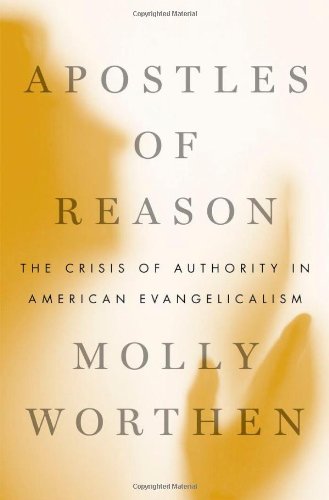

| Visitors Now: | |
| Total Visits: | |
| Total Stories: |

| Story Views | |
| Now: | |
| Last Hour: | |
| Last 24 Hours: | |
| Total: | |
New Books Alert: The Many Minds of Evangelicalism
Mark Edwards
Molly Worthen’s Apostles of Reason: The Crisis of Authority in American Evangelicalism (Oxford 2013), has been released early. I’ve been eagerly awaiting this book since I heard Worthen speak at last year’s AHA with Ed Blum. Here’s a description from Amazon. After the break, I offer a few thoughts based on a brief glance and personal experience.
Evangelical Christianity is a paradox. Evangelicals are radically individualist, but devoted to community and family. They believe in the transformative power of a personal relationship with God, but are wary of religious enthusiasm. They are deeply skeptical of secular reason, but eager to find scientific proof that the Bible is true.
In this groundbreaking history of modern American evangelicalism, Molly Worthen argues that these contradictions are the products of a crisis of authority that lies at the heart of the faith. Evangelicals have never had a single authority to guide them through these dilemmas or settle the troublesome question of what the Bible actually means. Worthen chronicles the ideological warfare, institutional conflict, and clashes between modern gurus and maverick disciples that lurk behind the more familiar narrative of the rise of the Christian Right. The result is an ambitious intellectual history that weaves together stories from all corners of the evangelical world to explain the ideas and personalities-the scholarly ambitions and anti-intellectual impulses-that have made evangelicalism a cultural and political force.
In Apostles of Reason, Worthen recasts American evangelicalism as a movement defined not by shared doctrines or politics, but by the problem of reconciling head knowledge and heart religion in an increasingly secular America. She shows that understanding the rise of the Christian Right in purely political terms, as most scholars have done, misses the heart of the story. The culture wars of the late twentieth century emerged not only from the struggle between religious conservatives and secular liberals, but also from the civil war within evangelicalism itself-a battle over how to uphold the commands of both faith and reason, and how ultimately to lead the nation back onto the path of righteousness.
From my quick read, it appears that Worthen offers a new paradigm for the study of post-World War II new evangelicals–a movement that has been well covered by Joel Carpenter, George Marsden, D. G. Hart, John Turner, and many others. Yet given that her focus is the paradoxical nature of evangelical anti-intellectualism–that evangelicals “have a habit of taking certain ideas very seriously” (1)–perhaps Mark Noll is her best conversation partner. In The Scandal of the Evangelical Mind (1994), Noll argued that traits inherent to the evangelical movement had long held its promoters back from genuine intellectual and cultural pursuits. Noll’s book helped me get over my fascination with one of the Worthen’s main characters, the apologist Francis Schaeffer. The Anointed: Evangelical Truth in a Secular Age (Belknap 2011), by Randall Stephens and Karl Giberson, similarly tackles Schaeffer and other experts ex nihilo (see Worthen’s review of Anointed here).
For Worthen, though, the problem is not that the evangelical straw man doesn’t have a brain; it has too many. The evangelicals of the American Century want to have it all: faith AND reason, status AND separateness, the Great Commission AND Great Low Prices. Here’s a few revealing passages from Apostles:
The problem with evangelical intellectual life is not that its participants obey authority. All rational thought requires the rule of some kind of law based on irreducible assumptions. The problem is that evangelicals attempt to obey multiple authorities at the same time. They demand that presuppositions trump evidence while counting the right kind of evidence as universal fact. They insist that modern reason must buttress faith, that scripture and spiritual feeling align with scientific reality (258). . . . The anti-intellectual inclinations in evangelical culture stem not from wholehearted and confident obedience to scripture, or the assurance that God will eventually corral all nonbelievers, but from deep disagreements over what the Bible means, a sincere desire to uphold the standards of modern reason alongside God’s word–and the defensive reflexes that outsiders’ skepticism provokes. The cult of the Christian worldview is one symptom of the effort by many evangelical leaders to fold competing sources of authority into one, to merge inference with assumptions. The evangelicals who adopt this soft presuppositionalism hope that it might prove to be a viable political currency, one that can buy cultural capital where proof texts and personal testimony fail. These habits of mind have crippled evangelicals in their pursuit of what secular thinkers take to be the aims of intellectual life: the tasks of discovering new knowledge, creating original and provocative art, and puzzling out the path toward a more humane civilization (261).
Needless to say, Worthen’s conclusions should elicit some equally strong pushback from evangelical strongholds–although I sense that her work is in several ways an apology for the evangelical paradox presented before the court of evangelicalism’s secular liberal detractors. D. G. Hart will no doubt have more to say about this in his review of Worthen’s book, which should be coming in a few months.
Finally, while on the subject of conservative Protestantism and secular culture, a shout-out to two new books available for pre-order: Steven Miller’s The Age of Evangelicalism: America’s Born Again Years (Oxford, April 2014); and my colleague Mark Correll’s Shepherds of the Empire: Germany’s Conservative Protestant Leadership, 1888-1919 (Fortress, March 2014).
Source: http://usreligion.blogspot.com/2013/10/new-books-alert-many-minds-of.html



